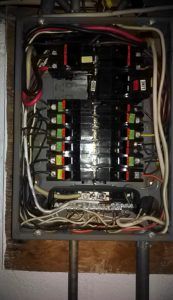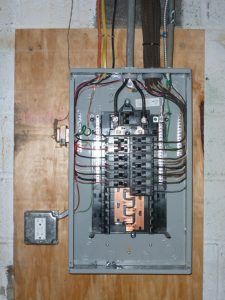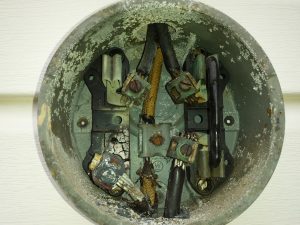Federal Pacific panels have been the subject for debate for years. From electrical inspectors, to insurance companies, they have been criticized, scrutinized, and in some cases deemed a fire hazard.
We come across these panels all the time; and change them out frequently. In our opinion they are not a “Fire Hazard” because half the homes in the U.S. would have gone up in flames by now, especially in Ohio! Before AC Electric becomes the subject of criticism, let us point what a fire hazard is.
Fire Hazard: An object, building, etc that could easily catch fire or cause a fire and thereby endanger life.
(Source: www.collinsdictionary.com)
Federal Pacific breakers, panels, bus bars, etc do not cause fires. The overload, mis-wiring and/or short circuit of a conductor is what causes the fire hazard condition. The concern is that if the breaker does not trip as it was originally intended for, then the potential of a fire is present. If you would like to identify whether you have a Federal Pacific panel or not, compare it to the picture displayed.
Now, rather than bore you with all the technical data and research you find online, let’s get straight to the point ―should you or should you not replace your Federal Pacific panelboard? Our answer is YES for the following reasons:
- Through research and insurance claims, these panels have been deemed to be a safety concern including, but not limited to, manufacturer defects.
- If the house goes up in flames due to a manufacturer defect, there is no one to sue—The Federal Pacific Electric Company is no longer in business.
- Some insurance companies will not insure the property; or, will at higher rates.
- There are no main disconnects on most of these panels. A main disconnect on them would be almost a redundant protector.
- Since Federal Pacific panels were installed between the 50’s and 80’s, the amount of electrical appliances available were minimal. Also, they are usually fed with 60-amp service conductors and meter bases. Nowadays a home is required to have a minimum of 100-amps in order to supply electrical for dish washers, electric dryers, ranges, etc.
- We don’t see any benefits of keeping your current Federal Pacific panel(s) other than saving yourself the cost of replacing them.
Meter Base and Service Wiring
Too common do we find customers’ homes upgraded with a 100-amp electrical service panel; connected to a 60-amp meter base. This is a mistake made by inexperienced electricians and/or handymen thinking since the conductor is rated for 100-amps, then the whole system is.
Although not identified in the meter bases, is has been a general rule of thumb in the past with the electric company that a round meter base is rated for 60-amps and a square meter base is rated for 100-amps. To the right you will see a picture of what happens when you have a 100-amp service panel connected to a round (60-amp ) meter base—the jaws and terminals on the wires overheat. Click on the picture to get a better view of the damage caused by the overload. If you notice, the bottom left hand jaw is missing because it broke off when the meter was pulled due to loss of power on half the home. Take a look at your meter base and make sure you have what you need.
AC Electric has been replacing fuse and Federal Pacific panels since 1999. Whether for violation corrections, updating equipment or your new home’s electrical service, we can provide you with your electrical panel installation. Unlike many electrical contractors who require the electric company to make the final connections, we do it for you as well; this eliminates the need for multiple outages and having to reset your clock! Additionally, we provide your installation with a Lifetime Warranty; and, it is transferable.
Call us today to evaluate your system’s electrical upgrade potential and to alleviate your safety concerns.
AC Electric… providing you the service you want with the attention you deserve!



